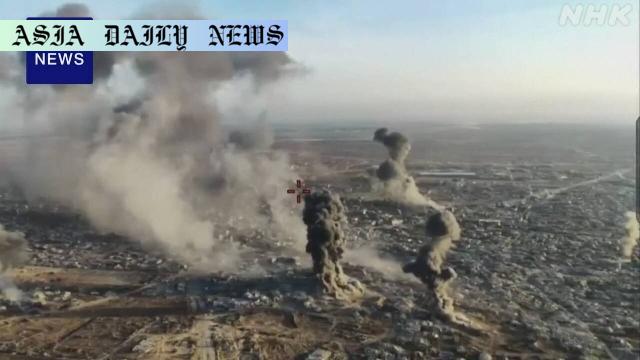Gaza Strikes: Over 130 Palestinians killed as Israeli airstrikes hit multiple targets in the Gaza Strip amidst tense ceasefire talks.
Israeli airstrikes in Gaza have killed over 130 people.
Military targets included underground Hamas infrastructure in Beit Hanoun.
Negotiations for a 60-day truce between Israel and Hamas in Qatar have seen little progress.

The Tragic Impact of Recent Gaza Strikes
The recent escalation in violence in the Gaza Strip has resulted in devastating consequences, with over 130 reported fatalities as a result of Israeli airstrikes. In a concerted series of strikes on Saturday, the Israeli military targeted 35 locations in Beit Hanoun, Northern Gaza. These locations reportedly included underground infrastructure linked to Hamas, a group the Israeli government considers a terrorist organization. Eyewitness footage provided by the Israeli military depicted explosions ripping through vast areas, sending columns of smoke towering over densely packed residential neighborhoods.
Media reports from Palestinian outlets revealed that these attacks have claimed at least 110 lives on Saturday alone, with an additional 27 casualties recorded in subsequent strikes on Sunday. Many of these deaths occurred in Nuseirat, located in central Gaza. The human toll, involving civilians including women and children, has further strained fragile attempts at peace in the region. These attacks occurred despite ongoing negotiations in Qatar between representatives from Israel and Hamas, brokered under a United States proposal advocating for a 60-day ceasefire.
Ceasefire Talks: A Glimmer of Hope Amid a Grim Reality
While talks for a truce continue under Qatari auspices, progress remains dismally slow. The proposed 60-day ceasefire seeks to facilitate humanitarian aid in Gaza, provide relief to civilians, and create a temporary pause in hostilities. Yet, as Israeli officials defend their strikes as a countermeasure against terrorism, the Gaza death toll underscores the escalating humanitarian crisis and the deeply entrenched geopolitical divisions in play.
At its heart, Gaza remains a flashpoint of repeated conflicts, each compounding the suffering of its 2 million residents. The failure of peace negotiations and the continuation of violence suggest a bleak picture of the region’s immediate future. Amnesty International and other humanitarian organizations have condemned the loss of civilian lives, calling for an immediate halt to hostilities and a renewed commitment to finding sustainable peace resolutions. Amid the rubble and chaos, families grieve for lost loved ones, and survivors struggle to find safety and stability in an increasingly dangerous environment.
The Broader Implications for Regional and Global Dynamics
The conflict in Gaza is not merely a local issue; it holds significant repercussions for regional and international relations. With each escalation, tensions rise across the Middle East, drawing in stakeholders such as the United States, Qatar, Iran, and others. Israel’s targeting of Hamas has received support from some allies, while others have raised concerns over civilian safety and proportionality in the military response. More broadly, the conflict reignites longstanding debates over the dynamics of power, occupation, and the rights of Palestinian peoples, topics that evoke sharp divisions on the global stage.
As the situation unfolds, global attention has returned to the dire living conditions in Gaza—a region plagued by economic hardship, water shortages, and dwindling healthcare infrastructure. International advocacy groups press for immediate humanitarian aid to the region, while political analysts warn of a protracted cycle of retaliation unless substantive diplomatic actions are achieved.



Commentary
A Humanitarian Catastrophe Unfolding
The recent airstrikes in Gaza paint a grim picture of the ongoing conflict between Israel and Hamas. Over 130 lives have been lost, with many victims being innocent civilians. This tragedy is yet another chapter in the cycle of violence that has gripped the region for decades. As the world watches, the toll of human suffering grows larger. It is imperative that both sides prioritize dialogue over destruction, as the human cost of each attack only deepens the scars of the past.
The Fragility of Ceasefire Negotiations
Ceasefire talks in Qatar represent a faint ray of hope amid these dark times, yet their lack of tangible results serves as a sobering reminder of the challenges facing peace in the Middle East. The proposed 60-day truce could provide much-needed relief to Palestinian civilians, yet such agreements have historically struggled to hold long-term. Without genuine efforts from international mediators and accountable actions from both parties, the ceasefire risks being another fleeting promise in a recurring tragedy.
The Role of the Global Community
The ongoing conflict underscores the need for heightened global awareness and intervention. International bodies, including the United Nations, must take decisive steps to address the root causes of this crisis, while avoiding a bias that could further alienate any involved party. Efforts must focus on securing human rights, ensuring civilian protections, and constructing a foundation for enduring peace. These are not easy tasks, but the alternative—a continued cycle of violence and loss—is far worse.
As the conflict continues to rage in Gaza, let us remember the human faces behind the headlines. Each life lost is a tragedy, and each family torn apart is a reminder of the urgent need for peace. Resolving this conflict requires strength, compassion, and an unwavering commitment to justice for all.